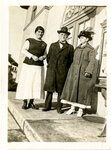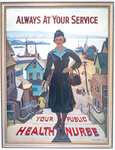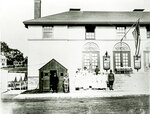




The Visiting Nurse Association of Massachusetts canceled a planned celebration later this month for the Manchester Woman’s Club in Manchester-by-the-Sea to mark the club’s role in founding its organization nearly 110 years ago to the day.
Back in 1910, this idea of a “visiting community nurse” and the VNA had been gaining ground in the northeast, along with nursing as a profession. And by December of that year, the club had called its initiative the “Manchester Visiting Nurse Association”, wrote up bylaws and hired its first part-time nurse, Miss Laura Carney. The women even purchased a bicycle for Miss Carney so she could make her rounds.
This month's event, canceled due to COVID-19, echoes what became so central just a few years after the VNA Massachusetts was founded when in 1918 the world faced down a worldwide pandemic. Today, with schools and many local downtown businesses shuttered and residents self-quarantining at home, Manchester might do well to remember that we have been here before.
The Cricket archives from 1918 show the “Spanish Flu” (an H1NI virus with genes of avian origin) struck the US in manner that unfolded with odd similarity to the present. Still embroiled in WWI, the country faced a new enemy, the Spanish Influenza pandemic. VNA nurses here worked locally here with the US Army out of Manchester’s Horticultural Hall on Summer Street downtown to tend to the sick.
The first wave of illness began amongst the soldiers fighting in the WWI European Theater and spread to the U.S. in the spring of 1918. The early phase of the epidemic was, for some reason, relatively mild. The initial mortality rate was low and the recovery rate good. This, combined with widespread political resistance towards shutting America down (along with its allies) in the midst of the WWI war effort to lull the US into a false sense of security that left the country ill prepared for what followed. By the fall of 1918, scientists now believe, the virus had mutated amongst the allied troops to a deadlier form that caused “rapid and severe lung damage” (according the CDC).
But America remained largely in denial. In Philadelphia, the Mayor refused to cancel a “Liberty War Bond” parade against the advice of his health professionals and a virulent outbreak of the disease followed in that city leaving 12,000 dead and the entire population quarantined. The disease, in its new and deadlier form, reemerged with unexpected ferocity in the fall of 1918 throughout United States and the world; infecting approximately 500 million worldwide and killing approximately 50 million. In the United States, the high contagion and death rate combined to shutter schools, businesses and government offices across the country. By the time this disease had taken its toll over the course of the next year, 650,000 Americans died.
The 1918 and 1919 editions of this paper tell the tale.
SEPTEMBER 28, 1918: Manchester Board of Health Moves to Check Influenza Epidemic
“The prevailing epidemic of influenza and pneumonia seems to have Manchester in its grip but, fortunately, a majority of the cases are of a light form and very few of a serious nature. Up to yesterday 45 cases had been reported to the Board of health and but one had been fatal, this being a maid in the household of one of the summer cottagers at Coolidge Point, and was on Saturday night last. William F. Spry one of our well known citizens was taken ill a week ago Thursday, the disease developing into pneumonia, growing rapidly worse and Thursday his life was despaired of. Many others have been quite ill. Hilliard A. Biggs, chauffeur for Mrs. C. A. Munn has been critically ill with pneumonia but is now out of danger. In some instances the disease has attached whole households, all of the family of Wm. K. Fleming excepting himself having been very sick this week.
The Board of Health have taken active and stringent measures to hold the disease in check and acting in conjunction with the Superintendent of Schools, closed all the public schools Wednesday until further notice. They also closed the Town hall to all forms of entertainment and public gatherings and cancelling all functions already announced including a Punch and Judy Show Thursday, a whist party and dance last night and the 50th anniversary of Post 67 GAR to have been held tonight. The moving picture theater has been closed indefinitely, Manager Sanborn having already taken measures to comply with the Governor’s request. The Gloucester Bus has discontinued trips and the town is well protected. The board feel that no special cause for alarm exists as Manchester is freer from the disease than most any other place hereabouts but they feel that an ounce of prevention is better than a pound of cure and are going on that principle to prevent the epidemic from getting any great headway here. The local physicians have been kept very busy. Dr. Glendenning was called to Gloucester Sunday morning to 11 p.m. and Tuesday worked there from 10 p.m. to 4.a.m. Dr. Tyler has also been there several days.”
In those same pages, “George E. Lendall, the first of our Essex young men to answer the last roll call passed from earth a Camp Upton, L. I. Tuesday, after less than one weeks sickness of influenza and pneumonia…his age was 32 years and he was the only child of his parents, Mr. and Mrs. William A. Lendall of South Essex where he had always lived. It is a very singular fact that he should be the first Essex man to be called away and the only person yet been taken by death resulting from the prevalent distemper.”
OCTOBER 5, 1918 - Essex. Mass.
“The schools are all closed by reason of influenza not to reopen until the distemper has abated…For the first time in the memory of the older citizens the bell in the Congregational Church was not rung nor services held in any of the churches on Sunday; this with the absence of autos on the street made the day a most trying one of quietness.”
NOVEMBER 23, 1918
“The following is a summary of the excellent work done at the Food Centre during the recent epidemic. At eleven o’clock, September 25 the Food Centre was as work on its fall jelly making. At eleven thirty it had become an emergency canteen for relief work in the influenza epidemic, and by fie o’clock had turned out 50 quarts of soup and 200 sandwiches … the largest daily output was 150 quarts of soup, 600 sandwiches and 50 quarts of apple sauce… The work was kept up continuously for twenty-six days in Manchester. In Manchester the soup, sandwiches and apple sauce were distributed by the homes by the assistant to the District Nurse, Mrs. George Dean who visited 15 to 20 families every day, reaching 45 families in all during the course of the epidemic.”
JANUARY 11, 1919: Influenza Epidemic Still Holds Sway Board of Health Will Keep All Restrictions on Another Week
“The “Flu” epidemic still has Manchester in its grip and at conference of the Board of Health and Selectman Thursday evening it was decided the best part of wisdom to keep all the public schools closed for another week, and the ban on the Town Hall and moving picture theater will also remain in force for one more week least…There has been one fatal case this week and there are several who have been critically ill and a number are still so. Among the more seriously ill are Mrs. Charles Lovegreeen and Miss Mary Doge Giles. The little daughter of Thomas Sheehan who was critically ill is now out of danger.”
Over the next few months the pages of this paper were filled with news of influenza illness and demise too numerous and tragic to list here but typified by the following:
JANUARY 18, 1919: Mrs. Gordon Northrup
“Of the many deaths that have saddened so many homes in Manchester and throughout the land of late there are none sadder than that of Mrs. Gordon Northrup (Dora May Marshall, age 23) the only child of Mr. and Mrs. Issac M. Marshall (original and then publisher and editor of the Manchester Cricket) of this Town, who passed from earth at the Salem hospital Friday evening of last week after an illness of but two weeks. Pneumonia having developed following influenza.”
Back in 1910, the VNA's first secretary wrote the group's mission in her report back to the Manchester Woman's Club, “It is not a paying business, nor will it ever be ... but other things count as well as money and are of far greater importance.”
By the end of the Spanish Flu epidemic, it was clear there were other things that were of far greater importance. At the time, in another letter to the Manchester Women’s Club, founder of the VNA summed up the disaster:
“It is impossible to say, as in our eight previous reports, that we have escaped serious epidemics this year, for in common with the rest of the world, we have met and suffered the terrors, losses and sorrows of the dreadful Influenza, now happily passed. Every community was suddenly confronted with distraught- of problems of caring for the numerous sick and feeding the helpless well. In most towns, these heavy burdens fell upon the Visiting Nurse Committee united with the Board of Health and ably aided by bodies of organized volunteer workers. Here in Manchester food was supplied from the Food Centre and the dangerously sick were cared for at an Emergency Hospital part of which were established and supported through the public spirit and generosity of Mrs. William Hooper.”
All articles from The Cricket’s 132-year archive were donated to the Manchester Public Library last year and are available online, free, for anyone to explore. Go to the library’s website and follow the prompts. If you would like to support the VNA, feel free to send a little something to: VNA Care Fund Development Office, 199 Rosewood Dr., Danvers.